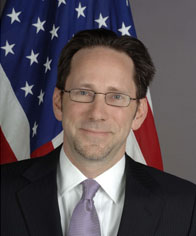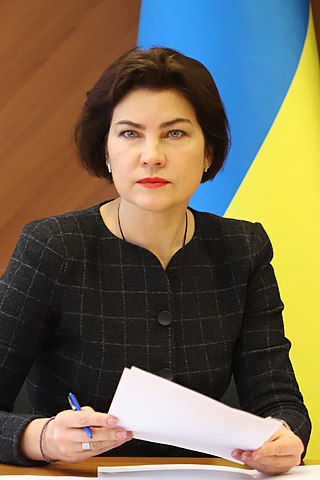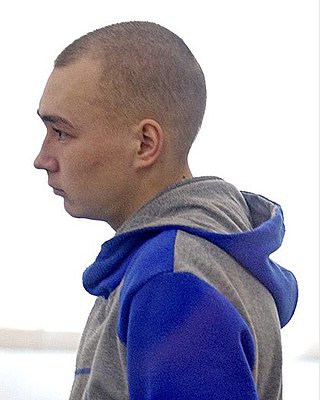
International criminal law (ICL) is a body of public international law designed to prohibit certain categories of conduct commonly viewed as serious atrocities and to make perpetrators of such conduct criminally accountable for their perpetration. The core crimes under international law are genocide, war crimes, crimes against humanity, and the crime of aggression.

The states parties to the Rome Statute of the International Criminal Court are those sovereign states that have ratified, or have otherwise become party to, the Rome Statute of the International Criminal Court. The Rome Statute is the treaty that established the International Criminal Court, an international court that has jurisdiction over certain international crimes, including genocide, crimes against humanity, and war crimes that are committed by nationals of states parties or within the territory of states parties. States parties are legally obligated to co-operate with the Court when it requires, such as in arresting and transferring indicted persons or providing access to evidence and witnesses. States parties are entitled to participate and vote in proceedings of the Assembly of States Parties, which is the Court's governing body. Such proceedings include the election of such officials as judges and the Prosecutor, the approval of the Court's budget, and the adoption of amendments to the Rome Statute.

Karim Asad Ahmad Khan is a British lawyer specialising in international criminal law and international human rights law, who has served as Prosecutor of the International Criminal Court since 2021.
The International Criminal Court's founding treaty, the Rome Statute, provides that individuals or organizations may submit information on crimes within the jurisdiction of the Court. These submissions are referred to as "communications to the International Criminal Court".

John Clint Williamson is an American diplomat, lawyer, and educator who has served in a variety of senior-level roles with the United States Government, the United Nations, and the European Union. He is the leader of the Atrocity Crimes Advisory Group (ACA), the agreed trans-Atlantic community mechanism for addressing atrocity crimes in Ukraine.

Gyunduz Aidynovych Mamedov is an Azerbaijani-born Ukrainian lawyer and human rights activist who has served as Prosecutor of the Autonomous Republic of Crimea since 22 August 2016, and also served as Deputy Prosecutor General of Ukraine from 18 October 2019 to 21 July 2021. In his position as Prosecutor of the Autonomous Republic of Crimea, he is the counterpart to the office of Prosecutor General of the Republic of Crimea, the equivalent position in Russia's Republic of Crimea. Due to the Annexation of Crimea by the Russian Federation, Mamedov had no ability to exert power over Crimea. Mamedov has also investigated Russian forces in the Russo-Ukrainian War for war crimes.

Iryna Valentynivna Venediktova is a Ukrainian politician, academic, and lawyer, previously a prosecutor general of Ukraine from March 2020 to July 2022. She was the first woman to hold the office and was suspended on 17 July 2022 by Ukrainian President Volodymyr Zelenskyy. On 19 July, Venediktova was dismissed following a vote in the Verkhovna Rada, which was tabled by Zelenskyy, and pointing to the presence of personnel collaborating with occupying Russian forces within her agency.

Since the beginning of the Russian invasion of Ukraine in 2022, the Russian military and authorities have committed multiple war crimes in the form of deliberate attacks against civilian targets, massacres of civilians, torture and rape of women and children, torture and mutilitation of Ukrainian prisoners of war, and indiscriminate attacks in densely populated areas.

The International Criminal Court investigation in Ukraine or the Situation in Ukraine is an ongoing investigation by the Prosecutor of the International Criminal Court (ICC) into "any past and present allegations of war crimes, crimes against humanity or genocide committed on any part of the territory of Ukraine by any person" during the period starting "from 21 November 2013 onwards", on an "open-ended basis", covering the Revolution of Dignity, the Russo-Ukrainian War including the 2014 annexation of Crimea by Russia, the war in Donbas and the 2022 Russian invasion of Ukraine. The ICC prosecutor commenced these investigations on 2 March 2022, after receiving referrals for the situation in Ukraine from 39 ICC State Parties.
The Russian invasion of Ukraine violated international law. The invasion has also been called a crime of aggression under international criminal law and under some countries' domestic criminal codes – including those of Ukraine and Russia – although procedural obstacles exist to prosecutions under these laws.
The Independent International Commission of Inquiry in Ukraine is a United Nations commission of inquiry established by the United Nations Human Rights Council on 4 March 2022 with a mandate to investigate violations of human rights and of international humanitarian law in the 2022 Russian invasion of Ukraine. The Commission delivered its reports on 18 October 2022 and 16 March 2023.
Universal jurisdiction investigations of war crimes in Ukraine are investigations of war crimes in the 2022 Russian invasion of Ukraine carried out under the legal systems of individual states under the universal jurisdiction principle of international humanitarian law. States that started investigations included Germany, Lithuania, Spain and Sweden.

The town of Borodianka was bombed extensively by the Russian Armed Forces during the Russian invasion of Ukraine.
Sexual violence in the Russian invasion of Ukraine has been committed by Armed Forces of Russia, including the use of mass rape as a weapon of war. According to the Independent International Commission of Inquiry on Ukraine, the victims of sexual assault by Russian soldiers ranged from 4 years old to over 80 years old.

During the Russian invasion of Ukraine, national parliaments including those of Poland, Ukraine, Canada, Estonia, Latvia, Lithuania and the Republic of Ireland declared that genocide was taking place. Scholars and commentators including Eugene Finkel, Timothy D. Snyder and Gregory Stanton; and legal experts such as Otto Luchterhandt and Zakhar Tropin, have made claims of varying degrees of certainty that Russia is committing genocide in Ukraine. A comprehensive report by the Raoul Wallenberg Centre for Human Rights concluded that there exists a "very serious risk of genocide" in Russia's invasion of Ukraine.
Carey R. Dunne is an American attorney. He is known for leading the criminal investigation of Donald Trump for the office of the Manhattan District Attorney until his resignation from the case, alongside his colleague Mark F. Pomerantz, in February 2022. In that role, Dunne successfully argued Trump v. Vance before the United States Supreme Court in May 2020; the court held that President Trump was required to comply with a state grand jury subpoena for his tax returns. Prior to his service at the DA's Office, Dunne was a longtime partner at Davis Polk & Wardwell, where he specialized in white collar criminal defense. Dunne is a past president of the New York City Bar Association.
The torture of Russian soldiers in Mala Rohan was an incident during the 2022 Russian invasion of Ukraine that occurred in the village of Mala Rohan. As documented by the UN High Commissioner for Human Rights, members of Ukrainian armed forces shot the legs of three captured Russian soldiers and tortured Russian soldiers who were wounded. The incident is likely to have occurred on the evening of March 25, 2022 and was first reported following the publication on social media of a video of unknown authorship between March 27 and March 28. As a case of summary execution and torture of prisoners of war, the incident might qualify as a war crime.

Vadim Yevgenievich Shishimarin is a Russian soldier who was the first person to go on trial for war crimes committed during the 2022 Russian invasion of Ukraine. On 18 May 2022, he pleaded guilty to fatally shooting an unarmed civilian, Oleksandr Shelipov. On 23 May, he was sentenced to life imprisonment. Shishimarin's lawyer lodged an appeal and on 29 July 2022, his sentence was reduced to 15 years in prison. Law professor Chris Jenks suggested that the legal reasoning, conviction and sentencing appeared to be flawed.
Since 2014, Russia falsely accused Ukraine of genocide in the Donbas region. Russian propaganda claimed that Ukrainian authorities have undertaken measures amidst the war in Donbas that amount to genocide against Russian speakers of Ukraine. They have been cited by Russian president Vladimir Putin in support of the Russian invasion of Ukraine, a large-scale escalation of the Russo-Ukrainian War.
The proposed International Criminal Tribunal for the Russian Federation is a proposed ad hoc international criminal tribunal aimed at prosecuting the Russian Federation and senior Russian and Belarusian leaders for the Russian invasions of Ukraine as one or more crimes of aggression, as a complement to the existing International Criminal Court investigation in Ukraine. Several international bodies announced their support for its establishment, including the Council of Europe, the European Commission, the NATO Parliamentary Assembly and the European Parliament.










